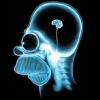Today would have been a good day to own Neuralstem stock - it closed 175% higher due to new information from the phase II study
Shares are rocketing 100% on back of the drug maker's successful updated Phase 2 clinical data in major depressive disorder, where the company's NSI-189 asset impressed at the 56th American College of Neuropsychopharmacology (ACNP) Annual meeting.
The 40 mg dose of the drug achieved statistical significance against the placebo, showing efficacy and antidepressant impacts for NSI-189, as reported in the poster presentation: “A Phase 2, Double-Blind, Placebo-Controlled Study of NSI-189 Phosphate, a Neurogenic Compound, Among Out-Patients with Major Depressive Disorder.” The cognitive advantages seen on Cogrscreen were on objective as well as subjective measures, in terms of attention and memory. With the CUR team cheering the "meaningful" benefits of its drug, the Street is taking bullish notice of a drug that looks both safe and well-tolerated, with no serious adverse events experienced during the trial. Two added self-rated secondary endpoints, CPFQ and QIDS indicated improvements in depressive symptoms that hit statistical significance, further placing the prior SDQ endpoint's benefit in spotlight.
“NSI-189 appears to be a broad-acting antidepressant, with effects in both core symptoms of depression and in aspects of cognition where standard antidepressants typically show very modest effects. These results warrant the continued study of this compound among MDD patients who are inadequately managed by current antidepressant therapies,” said Maurizio Fava, MD, Director of the Division of Clinical Research of the MGH Research Institute and Executive Vice Chair, Department of Psychiatry at Massachusetts General Hospital, and the principal investigator of the trial.
In the Phase 2 trial, 220 subjects were randomized to: NSI-189 40mg daily (n=44), NSI-189 80mg daily (n=44), or placebo (n=132) for 6 weeks (Stage 1). At the end of 6 weeks, placebo-treated subjects who were non-responders (defined as less than 50% reduction in Montgomery-Asberg Depression Rating Scale (MADRS)) with a MADRS score greater than 15 were re-randomized to 6 weeks treatment with NSI-189 40 mg daily (n=22), NSI-189 80 mg daily (n=22), or placebo (n=22) (Stage 2). Patients on NSI-189 who completed Stage 1 continued the same dose for another 6 weeks. The primary outcome measure was the MADRS. Secondary outcome measures included the 17-item Hamilton Depression Rating (HAMD-17), the Symptoms of Depression Questionnaire (SDQ), the Cognitive and Physical Functioning Scale (CPFQ), the patient-rated version of the Quick Inventory of Depressive Symptomatology Scale (QIDS-SR), and CogScreen and CogState objective cognitive tests. Efficacy results concerning all patients randomized in Stage 1 were pooled (50:50 weighted average) with the Stage 2 results of all re-randomized patients who had been non-responders to placebo in Stage 1.
Using the Sequential Parallel Comparison Design (SPCD) pooled analysis approach, MADRS score reduction from baseline with 40mg or 80mg NSI-189 versus placebo did not reach statistical significance (mean difference -1.8, p=0.22, mean difference -1.4, p=0.34, respectively). However, the 40 mg dose resulted in a statistically significant reduction in SDQ (mean difference -8.2, p=0.04), and CPFQ scores (mean difference -1.9, p=0.03) versus placebo in the pooled SPCD analyses. There was also a statistically greater reduction in QIDS-SR scores versus placebo for patients treated with 40 mg of NSI-189 in Stage 2 (-2.5, p=0.04), but not Stage 1. Differences for the 80 mg dose versus placebo on these three self-report measures were not statistically significant.
In addition, the 40mg dose also showed statistical advantages on objective measures of attention and memory as per the Cogscreen test, but not the Cogstate test: Simple Attention (SATADRTC, p=0.034; Complex Attention (SATACACC, p = 0.048) and Memory (SDCDRACC, p = 0.002; also seen with 80mg dose, p = 0.015).
Both doses were well-tolerated with 0, 0 and 7 subjects discontinuing treatment with 40mg, 80mg and placebo, respectively, due to intolerance in Stage 1, and 1,0 and 1 subjects discontinuing treatment with 40mg, 80mg and placebo, respectively, due to intolerance in Stage 2. Furthermore, no subjects treated with NSI-189 experienced a serious adverse event during the study.
"We are extremely pleased that the novel, neurogenic, neurotrophic mechanism of action of NSI-189 has shown both antidepressant and pro-cognitive activity in depressed patients, and which appears to result in meaningful benefit as reported both by the patients themselves and by objective computerized measurements. These results further support those from the previous Phase 1b in subjects with MDD, which demonstrated potential efficacy on both depression and cognition scales. We look forward to meeting with the Food and Drug Administration (FDA) in the first half of 2018 to further define the clinical development and regulatory paths for NSI-189, as well as to submit the results of this study to a peer reviewed publication by the end of this year," said Rich Daly, Chairman and CEO, Neuralstem.


















































